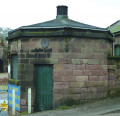The largest community in the area in 1817, Pentrich was the centre of planning for the rebellion in Derbyshire. Many from the village joined the march on 9th June. Six Pentrich men were transported to Australia and five imprisoned. The landlord, the Duke of Devonshire, evicted families that took part and demolished their homes. En-route see the commemorative plaques (*) placed by the Pentrich Historical Society.
(*)(B) The site of Thomas Bacon’s house who was a 64-year-old stocking frame knitter, previously a fetler at Butterley Works. An enthusiastic supporter of Thomas Paine and guiding light of the rebellion, he founded Pentrich Hampden Club. He called for universal suffrage and was Derbyshire delegate to a national meeting in London in January 1817 which presented half million signatures calling for reform. He attended meetings in Nottingham and Yorkshire planning a revolt.
On the left opposite the Village Hall was(*)James Shipman’s house (C), Shipman gave evidence for the prosecution at the Derby trial, then(*) (D) The White Horse Inn kept by Nancy Weightman, sister to Thomas Bacon, she supported his views enthusiastically and got her sons actively involved in the rising. The Pentrich Hampden Club met at The White Horse, Oliver The Spy attended meetings there and Jeremiah Brandreth stayed over on 8th June 2017.
(*)(E) The Reverend Hugh Wolstenholme was the curate of St. Matthew’s Church in 1817. He came from a Sheffield family with radical views and favoured reform. He condemned the hanging of four young men for burning Colonel Halton's hay ricks as 'murder' and hid escaping rebels in his church when the rising failed. He supported the families of rebels in the aftermath until he was removed from his position. In 1818 he emigrated to the United States.
Crossing the fields are lovely views of Amber Valley, towards Crich, and the route taken by the rebels on the night of the 9th June 1817, from South Wingfield.
(*)(F) Thomas Bacon hid in a building near the Mill before fleeing, though he was captured and transported for life. The rebels reunited here as they continued to collect weapons and men. At Mr Wheatcroft's farm, Buckland Hollow, they took three men and a gun. George Weightman ‘borrowed’ a pony from William Booth and rode off to Nottingham, to inform the gathering ‘rebel army’ of their approach. At Pentrich Lane End junction(*) , site of the Devonshire Arms(*)(G), (removed for development) the plaque is now set into the new wall, the rebels continued to Pentrich, then Butterley. Opposite the junction see the Mile Marker dating from the 1760’s, the arrival of the Turnpike Road.
(*)(H) At Mrs. Hepworth's house her servant Robert Walters was shot and fatally wounded.
Completed in 1793 the Cromford Canal, built by Benjamin Outram and William Jessop, joined the canal systemdown the Erewash Valley at Langley Mill, serving Butterley Works(*). Geeson’s scrap yard was formerly the colliery. Known as comparatively safe, its pumping engine was on display at the Science Museum, London, and was one of the earliest pits to stop using pit ponies. It employed Pentrich men from 1750.
Walking up this road you follow the footsteps of the rebels. The Butterley Iron Works(*) (I), founded in 1790 by Benjamin Outram, exploiting local iron, coal and limestone, was the biggest employer in the area. The rebels came to seize arms and men. Refused entry by the manager, Mr Goodwin, who had previously been forewarned of the rising, the rebels failed to gain entry and continued their march towards Nottingham. Bacon had worked at the foundry and knew it as a source for weapons. He hoped to recruit men who worked there. John Cope, who had been in the Hampden Club and worked at Butterley, said the workers were too well paid to be interested.
Halfway up the hill on the right was (*)(J)Asherfield Barn. Bacon organised a series of night meetings here. On 30th May a large meeting was told that all was ready and the plans for the rising set out on 4th June. On 5th June, Bacon brought Jeremiah Brandreth to the meeting. It was also attended by George Crabtree, claiming to be a delegate from Leeds, another spy for the authorities and agent provocateur, who assured the Pentrich men that a rising was ready across the North and Midlands and that they must be steady, firm and unanimous’.














